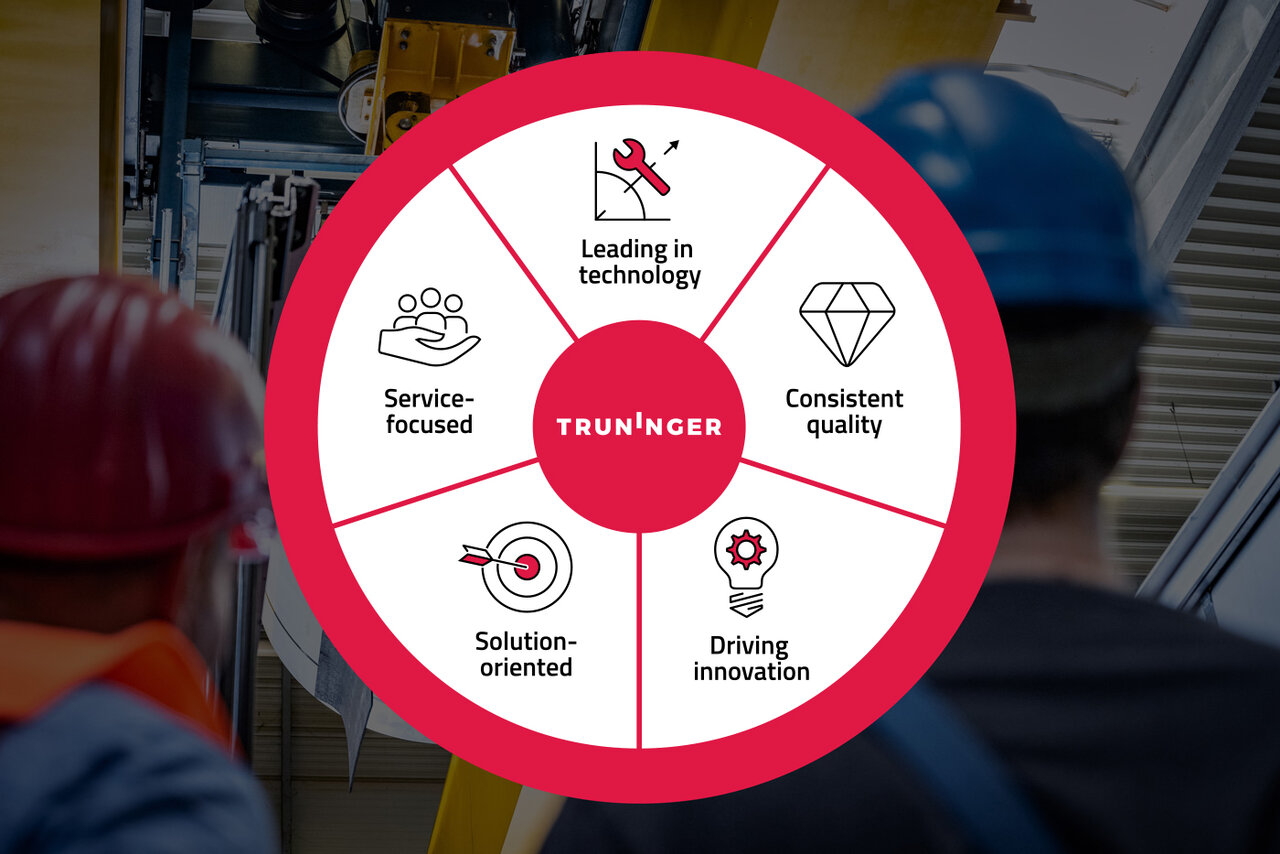
15 October 1923
Paul Truninger Senior, a graduate engineer in electrical engineering from the ETH (Swiss Federal Institute of Technology in Zürich), opens an electromechanical workshop in Solothurn. With great success: Only five years later, he is employer to 45 people.

1923 and the following years
"Innovation Made in Switzerland": A large number of patents testify to the inventiveness and creativity of the company's founder.

1934
The company acquires a new manufacturing building in Solothurn. First products were soldering irons branded "Zedes", welding transformers as well as voltage regulators for small, private power generation plants.

1934
Presentation vehicle: the first "roadshow" vehicle for welding transformers.

1935
Construction of the first stretching machine, the ingenious simplicity of which—from today's perspective—is more than astonishing and can hardly be surpassed.

1938
Problems with purchased hydraulic pumps motivate inventor Paul Truninger Senior to develop his own pump; the new product based on a multi-stage internal gear principle.

1943
Anniversary: In the midst of World War II, the company celebrates its 20th anniversary.

1945
After WWII, a shortage in copper prevails in Europe. In a unique pioneering achievement, the company is driven to develop the first scrap magnet with aluminium winding.
1957
"TRUNINGER AG": The sole proprietorship "Paul Truninger, Solothurn" becomes the shareholder company "TRUNINGER AG"; it still bears its founder's name.

1965
Company founder Paul Truninger Senior retires from active management. His sons Paul and Kurt Truninger assume control and continue to run the company with a streamlined product range: From now on, the focus is on the products pumps, magnets, and stretching machines.
The company develops new types of pumps, which become wide spread in the market also manufactured and distributed by licensees in England, Germany, the USA, as well as Japan.

1974
Half a century: TRUNINGER AG celebrates its 50th anniversary and, marking the occasion, moves into a brand new manufacturing building in Langendorf.

1976
TRUNINGER establishes a German subsidiary under the name TRUNINGER GmbH in Waldkraiburg near Munich. A few years later, the company relocates to Wiehl, not far from Cologne, for logistical reasons.

1982
A new building for the pump manufacturing division complements the plant in Langendorf, Switzerland.

1993
TRUNINGER completes the development of the fifth generation internal gear pumps QX and takes them to market.
A hydrostatic plain journal bearing extends the range of applications for the pumps to very low speeds.

1994
Power electronics replace electromechanical contactors: TRUNINGER introduces its first electronic magnet controller "QuickPick". It offers significantly improved safety, the highest speed of any magnet controller on the market, simple operation and automatic fault diagnosis for fast troubleshooting. On switch-off, a new method is applied to completely remove residual magnetism.

1995
TRUNINGER AG introduces a quality management system and is certified according to ISO 9001.

1996
TRUNINGER develops the first prototype of a cylinder drive with direct pump drive that does not require valves. The company is also developing a new electro-hydraulic drive called "EPQ", which integrates servo motors with QX internal gear pumps.

1998
Anniversary: TRUNINGER AG celebrates its 75th anniversary.

2000
Our founder's grandsons Rolf and Felix Truninger take over the shares as well as the management of TRUNINGER AG. Now family-run in the third generation, the company concentrates on the product areas of lifting magnet technology and electrohydraulic drive technology.
The production as well as the distribution of internal gear pumps are sold to Bucher Hydraulic Group.

2004
Modern times: Employees move into a newly erected office building. This brings production and administration closer together: in bright rooms with a powerful PC network, the comfort of modern air-conditioning and a cafeteria with a panorama terrace.

2005
The magnet controller "SmartPick" is launched. Its modular design allows industrial production in series. In the "SmartPick"controller, Sensors, microcontrollers, power supplies and control devices are duplicated and mutually monitored. This redundant system design increases safety to category 3.

2008
For its subsidiary in Germany, TRUNINGER GmbH acquires a new building on Carl-Zeiss-Strasse in Wiehl and renovates it. A team of salesmen and service technicians keeps the well over 1,000 active magnet systems in Germany going—and the corresponding customer contact up alive.

2009
TRUNINGER's team delivers a stretching machine with 1,500t tensile force. This huge machine has a dead weight of around 220 tons and can stretch-straighten aluminium sheets with a wall thickness of up to 60mm and dimensions of 2.2 x 12m.

2010
In the land of the rising sun: TRUNINGER K.K. is founded for the distribution and maintenance of our products in Japan. The company settles in Kobe at the foot of the Roko Mountain—within walking distance of the Shinkansen train station.
From then on, a dedicated team is at the disposal of our Japanese customers. It consists of a Japanese sales engineer, specialists in Switzerland and networked service partners.

2012
Welcome to South America: With TRUNINGER Ltda. in Campinas in Brazil's São Paulo district, TRUNINGER AG establishes a sales subsidiary on the South American continent. The projects in Brazil and the surrounding countries are now managed locally with Portuguese and Spanish spoken.
The picture shows the Gerdau Açominas S/A steel mill in Ouro Branco (source: customer).

2015
German TRUNINGER GmbH in Wiehl is expanding its site. A new building creates a total of 2,900 square meters of office and manufacturing space. A large part of the property is rented to the companies StrikoWestofen GmbH and BPW Bergische Achsen KG.

2019
TRUNINGER K.K. sales office in Japan moves into new premises. They are centrally located near the JR Kobe train station. The company is thus expanding the focus of its activities to the entire East Asia region.
The picture shows the JR station in Kobe.


